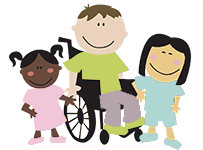 The American Occupational Therapy Association (AOTA) defines occupational therapy as a “skilled treatment that helps individuals achieve independence in all facets of their lives. Occupational therapy assists people in developing the ‘skills for the job of living’ necessary for independent and satisfying lives”.
The American Occupational Therapy Association (AOTA) defines occupational therapy as a “skilled treatment that helps individuals achieve independence in all facets of their lives. Occupational therapy assists people in developing the ‘skills for the job of living’ necessary for independent and satisfying lives”.
According to the Mayo Clinic, “Autism spectrum disorder is a serious neurodevelopmental disorder that impairs a child’s ability to communicate and interact with others. It also includes restricted repetitive behaviors, interests and activities. These issues cause significant impairment in social, occupational and other areas of functioning”.
Though there is a broad range of deficit within autism spectrum disorders (ASD), from a mild to severe, all children with autism typically face challenges that impact independence at home and/or school. An occupational therapist has the training and experience to help children with autism address the skills needed to do their best in tasks of daily living and learning. These tasks include dressing skills, hygiene, physical coordination, playing and socializing, using scissors, handwriting, and play skills (yes, play is the work of childhood and may not often come naturally). Children with autism may have sensory challenges which contribute to behavior problems and learning.
Activities of Daily Living
Occupational therapy combines a variety of strategies based on the individual needs of each child. An occupational therapist will engage children in fine motor activities that will help them develop hand coordination and strength. These activities could include using tongs, stringing beads, and manipulating Theraputty. Whenever possible, these activities are done with age appropriate play or tasks, to increase generalization. Play activities are also used to help children engage in social interactions and communication with others. For school-aged children, handwriting may be addressed when appropriate. To help children with transitions and distractions, occupational therapists will use adaptive strategies that can include teaching coping skills, modifying the environment, and using visual schedules. Occupational therapists can also address physical coordination that includes activities to help increase overall strength, endurance, and posture.
Sensory Integration
Many occupational therapists also use sensory integration during therapy sessions to help children on the autism spectrum with sensory processing challenges. SI (sensory integration) therapy for autism is based on the premise that difficulty interpreting sensory information affects the ability to participate fully in everyday activities. Typical sensations are often perceived as distracting or distressing for children with autism. Others don’t use sensations from their body to guide movements and thus have difficulty participating in active play and other movement activities. An occupational therapist will address these sensory needs and will help the child manage them better. These activities could include tactile play with various textures to decrease tactile defensiveness and play in a ball pit to help improve body awareness. With improved processing of sensation, children will often be able to better participate in everyday tasks as well as increase focus for learning. For sensory integration disorder treatment via occupational therapy Richardson families can visit our East Plano location, near George Bush and central expressway.
Parents are Important
Occupational Therapists work closely with families; providing training, adaptive materials and support that will encourage the greatest carryover of skills.
The overall goal of occupational therapy is to help children with autism improve their quality of life. Occupational therapy is one tool in the toolbox of autism treatments that will add to children’s independence and competence. To learn more about pediatric occupational therapy and speech therapy Murphy families can contact us at 972-424-0148. Speech & Occupational Therapy of North Texas is a network provider for most major insurance companies
